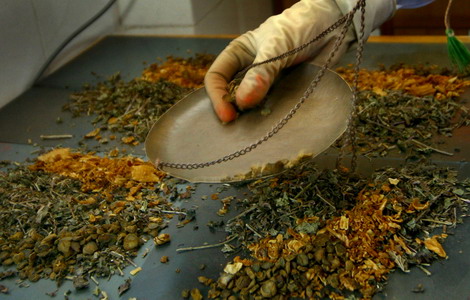 |
|
|
|
|||||||||
|
 A traditional Chinese medicine shop in Nanjing, Jiangsu province. Despite the robust growth of the sector, China is facing multiple challenges in exporting TCMs. [Photo / China Daily] |
Beijing Tongrentang Group Co Ltd opened its first Middle East pharmacy in Dubai, the luxury port in the United Arab Emirates, in October.
Covering more than 300 square meters, the pharmacy of China's leading company in traditional medicines is situated in the Dubai Healthcare Center - a free zone for comprehensive medical and healthcare treatment - which has attracted investment of $1.8 billion.
In addition to selling TCMs, including some medicinal sliced herbs and nine formulary medicines that have been granted local authority approval, the pharmacy also offers an onsite health consultancy.
Meanwhile, the building also doubles as a museum, displaying TCM processing tools, such as mortars and pestles, while old photos depict both TCM culture and Tongrentang, a Chinese brand with a history of 343 years.
According to Ding Yongling, deputy-general manager of Tongrentang, the company has also joined hands with Confucius Institutes in Abu Dhabi and Dubai to conduct lectures on traditional Chinese healthcare and offer free TCM consultancies. Confucius Institutes are non-profit academies aimed at the global promotion of Chinese language and culture.
"We combine our products with history and culture to help foreign people get a real understanding of TCMs, and to help establish our premium brand in the international market," said Ding.
Tongrentang started its overseas expansion in 1993, when its first non-mainland outlet opened in Hong Kong. It now runs 64 pharmacies in 16 nations and regions, including the United States, the European Union and Asia.
The Beijing-based company is now China's largest exporter of formulary TCMs by volume after its combined exports registered annual double-digit growth for 15 consecutive years, reaching $28 million in 2010.
"Despite our robust growth, we are facing many challenges and uncertainties in the international market," said Mei Qun, Tongrentang's general manager, at the end of 2011. He cited a lack of internationally unified technical standards for TCMs, constant changes to the registration rules, difficulties in research and development and the current global economic slowdown as examples of the problems the company faces.
While the development of Tongrentang reflects the growth of the TCM sector, the difficulties it has experienced are also causing headaches for many other exporters of TCMs.
Robust growth
China exported TCMs valued at $2.33 billion last year, an increase of 36.2 percent compared with 2010. At the same time, the export volume increased by 14 percent and prices by 23 percent.
The 2011 figures follow on from several years of expansion: China's TCM exports increased to $1.8 billion in 2010 from $600 million in 1996, according to the China Chamber of Commerce for Import & Export of Medicines and Health Products. TCMs include formulary medicines, raw materials and medicinal sliced herbs, plant extracts and healthcare supplements.
"The renminbi's rate of appreciation in 2011, which was about 7 percent, helped the value of TCM exports to hit a record last year," said Liu Zhanglin, vice-president of the chamber, adding that the export value is expected to rise by more than 10 percent annually during the next five to 10 years.
He attributed the continuous growth to the increasing demand in the international market as more Westerners adopt a "green and natural" lifestyle and regard TCMs as a safer and greener alternative to synthetic pharmaceuticals.
According to the World Health Organization, global sales of organic medicines totaled $60 billion in 2010, accounting for around 30 percent of global pharmaceutical consumption. The WHO has predicted that consumption of organic treatments will see annual growth of more than 10 percent over the next decade, with the international trade in TCMs increasing by around 10 percent annually over the same period.
Tongrentang said it will expand its overseas chain to 100 pharmacies by 2015 and maintain its dominant position in China's formulary TCM export sector.